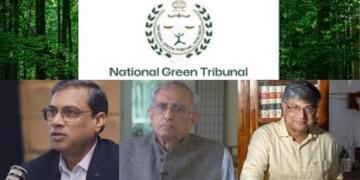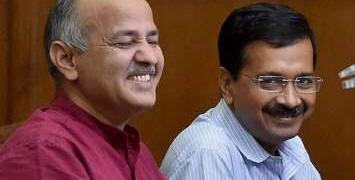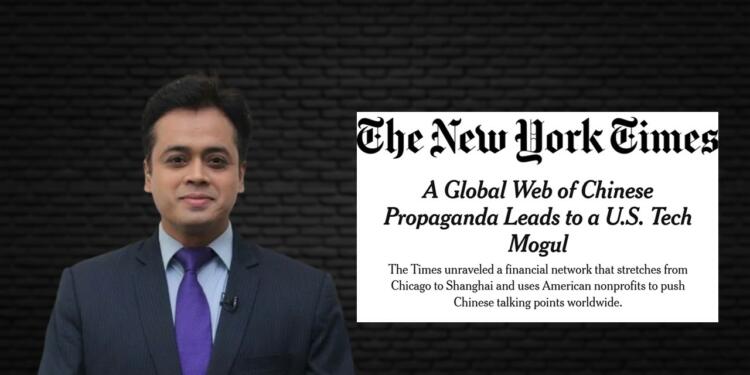You may remember the iconic meme, “We didn’t expect Special Forces,” but it seems that the New York Times has ironically decide to make this notion come true. Known for its occasionally vitriolic takes on India, the NYT has taken a bold step by accusing Abhisar Sharma and his so-called news portal of having connections with China and peddling their agenda.
In the world of news and media, unexpected revelations are nothing new. The New York Times, a publication often known for its strong views on various global issues, has once again made headlines, but this time for a different reason altogether. In a surprising turn of events, the esteemed publication has turned its investigative gaze towards notorious fake news peddler Abhisar Sharma and his media outlet “Newsclick,” exposing a web of Chinese propaganda and funding.
The article that could open a can of worms
In their comprehensive investigative piece titled “A Global Web of Chinese Propaganda Leads to a US Tech Mogul,” the New York Times delves deep into a financial network that stretches from Chicago to Shanghai, which uses American resources to disseminate Chinese talking points worldwide. The man behind this network is Neville Roy Singham, a figure whose name might provoke some ironic chuckles. Singham, who handled this Chinese sleeper cell, was revealed to be quietly funding left-wing causes during his time at Thoughtworks. After selling Thoughtworks for a staggering $785 million, his activism seemed set to intensify.
Shocking!
New York Times investigation reveals NewsClick media portal in which @abhisar_sharma works is funded by China to do propaganda in India.
Don't forget Congress supports and promotes @newsclickin. Why? Because of Chinese MoU?#ChineseAgentAbhisar pic.twitter.com/IeuAAY5CKd
— Ankur Singh (Modi Ka Parivar) (@iAnkurSingh) August 6, 2023
Following the money trail, the NYT tracked millions of dollars flowing across continents. From a South African political party to YouTube channels in the United States, and nonprofits in Ghana and Zambia, the network’s influence was widespread. Even in Brazil, money found its way to a publication called Brasil de Fato, which presented articles on land rights while praising Xi Jinping.
Also read: BBC caused 2 million deaths across Europe because of its fake reporting
The Chinese connection of Newsclick
But the most significant revelation was the network’s financing of NewsClick, a news site in New Delhi that thinly veiled its coverage with Chinese government talking points. Videos on NewsClick expressed admiration for China’s history, claiming inspiration for the working classes. Such blatant propaganda raises serious questions about the site’s credibility and independence, especially since it claimed to be a voice of journalism “unemployed by fascist forces.”
Further investigation by the NYT revealed that these groups operated in close coordination. Cross-posting articles, sharing content on social media, and even sharing staff members and office spaces were common practices. The network was interconnected and secretive, often conducting interviews without disclosing their ties.
This exposé has left many questions hanging in the air. For those who previously supported NewsClick and Abhisar Sharma, the revelations must be a bitter pill to swallow. For the Khan Market cartel, who cry “fascism” at the drop of a hat, this is something they’d rather not talk about.
The fallout from this investigation will undoubtedly be far-reaching. Questions about journalistic integrity, credibility, and independence will be raised. The public will demand accountability and transparency from media outlets and journalists. The New York Times may have unwittingly initiated a reckoning in the world of Indian media, unearthing skeletons that many hoped would remain buried.
As we wait to see how this story unfolds, one thing is certain – the power of investigative journalism should never be underestimated. In a world where information is both currency and weapon, journalists and media outlets must remember their duty to truth, objectivity, and the public interest. Only then can the fourth estate fulfill its vital role as a watchdog and guardian of democracy. Let the revelations be a warning to all – the truth will always come to light, and the pursuit of truth will never be silenced.
The dark world of “independent journalism” in India
The allegations brought forth by the New York Times are not to be taken lightly. The link between a US tech mogul and Chinese propaganda raises concerns about how far the long arm of China’s influence extends, infiltrating media and shaping narratives. It’s not uncommon for countries and political entities to use media outlets as soft power tools to influence public opinion in their favor. However, when the line between journalism and propaganda becomes blurred, it erodes the trust that the public places in media.
This incident brings to the forefront the importance of journalistic ethics and integrity. As consumers of news, we must be vigilant and discerning about the sources we trust. In an era of information overload and rampant misinformation, it’s crucial to fact-check and verify before accepting anything as truth. The onus is not just on journalists and media organizations but also on us, the audience, to be critical thinkers and responsible citizens.
While the New York Times investigation has highlighted the dubious nature of NewsClick and its connections, it also raises questions about the broader state of media in India. The country’s media landscape has become increasingly polarized, with media outlets aligned with different political ideologies and vested interests. As news consumers, it’s imperative that we seek out diverse perspectives and stay informed about different viewpoints.
Also read: BBC tax evasion: Income Tax Department finally crushes BBC’s pride
Ultimately, the New York Times investigation serves as a reminder that the media’s role as the Fourth Estate is not to be taken lightly. It is a responsibility that comes with the power to shape public opinion and influence society’s direction. With power comes accountability, and journalists must never lose sight of their duty to serve the truth and the public interest.
The New York Times’ investigation into the Chinese connections of NewsClick and Abhisar Sharma has exposed a troubling web of propaganda and funding. It is a stark reminder of the need for responsible journalism, media transparency, and public vigilance.
The New York Times’ investigation serves as a wake-up call for the Indian media landscape. It calls for a proper investigation into the current crop of YouTube journalists who seem to have a soft spot for the autocratic Chinese regime. Sites like Tehelka and Mojo Story, which continue to operate despite a lack of significant revenue, raise eyebrows about their funding sources and corporate blessings.
As India’s media landscape navigates through this critical juncture, we must prioritize truth, accuracy, and journalistic integrity to ensure that the Fourth Estate remains a robust pillar of democracy. Only then can we regain the trust that the public places in media and continue to uphold the principles of a free press in our nation.
Support TFI:
Support us to strengthen the ‘Right’ ideology of cultural nationalism by purchasing the best quality garments from TFI-STORE.COM

























